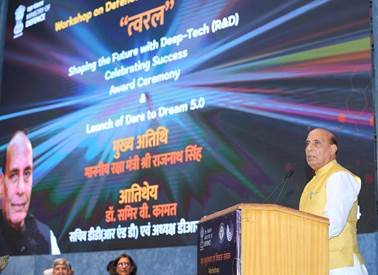Rajnath Singh launches ‘Dare to Dream 5.0’ for next gen innovators
Defence Minister Rajnath Singh has called upon the private sector to take a stronger lead in the defence industry and move forward from just “participation”, by assuring that the Government’s full support to make India an innovation & technology hub and one of the strongest countries in the world cii.in .
He was addressing scientists, industry leaders, academia, start-ups, MSMEs and young entrepreneurs during Twaral, a DRDO-Industry Workshop on Defence Technology Acceleration organised at DRDO Bhawan in New Delhi on 18 Oct bseindia .
The minister shared insights on the transformation of the defence sector in the recent past, and underscored that, today, technology has transformed conventional warfare into unconventional warfare nseindia .
“New dimensions have been added to modern-day warfare such as drones, cyber warfare, bio-weapons and space defence. In this transformative phase, R&D in defence will definitely make the defence sector stronger sbi.com.in .
“It is heartening to witness our scientists, industrialists, academia, start-ups, MSMEs and young entrepreneurs working together in this endeavour sidm.in . It is time for the private sector to take lead as it has the ability to absorb rapid changes and create new innovations,” he said startupindia .
Rajnath Singh termed the adoption of unconventional ideas, not yet known to the world, as the only way to progress in unconventional warfare makeinindia .
Acknowledging it as a tough task, he stated that the Government will continue providing all necessary support to the youth, scientists, industrialists and MSMEs in this endeavour.
He reiterated the Government’s commitment to make the defence sector more innovative and technology-oriented.
Highlighting the consistent efforts being made by DRDO to strengthen the R&D environment and promote scientific temperament, he said, “Technology Development Fund (TDF) scheme is providing up to 90% of the total project cost as grant support to eligible industries.
“The total support is up to Rs.50 crore, a good amount for any MSME and start-up to invest in defence R&D.”
Since its launch six years ago, 79 projects have been sanctioned, of which, technology has successfully been developed in 18 projects, he informed.
As part of the event, Rajnath Singh launched ‘Dare to Dream 5.0’ to encourage next generation of innovators & start-ups to come forward with transformative ideas for defence applications. The fifth edition of DRDO’s innovation contest aims to generate cutting-edge solutions for India to progress further in its pursuit to achieve ‘Aatmanirbharta’ in defence technologies.
The minister also felicitated the winners of ‘Dare to Dream 4.0’, recognising individual innovators, start-ups and MSMEs for disruptive solutions and innovations in the fields of countermeasures for drones and swarm of drones; advanced acoustic system to locate gunfire, directed energy technologies, cognitive listening device, target seeking & proximity sensing, free-space laser communication system, multi-terrain multi-utility robot among others.
Rajnath Singh described the challenges as a testament to the commitment of the industrial ecosystem of the country to protect the future of the defence sector.
“Like our brave soldiers, scientists, industry leaders, academia, start-ups, MSMEs and entrepreneurs too are the warriors of the country, prepared to complete every assigned task,” he said.
He laid emphasis on the need to achieve advancements in both incremental and disruptive technologies within the defence sector.
The solutions to challenges obtained through initiatives such as ‘Dare to Dream’ bridge the critical gap between the two types of technologies, he said.
He called upon the scientists, start-ups & young entrepreneurs to think out-of-the-box and come out with latest innovations as if it were their habit to accept & overcome challenges.
Rajnath Singh exhorted the private sector to move in line with the unprecedented speed with which the technological changes are taking place across the globe.
He urged them to ensure, through timely assessment, that a technology does not become outdated when it is rolled out.
He also called for development of projects, under TDF, based on cutting edge tech, and devising a system of comprehensive scan within the scheme to avoid duplication of technologies.
Deep-Tech Challenges — Several challenges on Disruptive, Emerging, Enabling and Pioneering Technologies (Deep-Tech) were also launched to drive major advancements in areas critical to the country’s defence infrastructure. The focus on Deep-Tech emphasises the need for India to develop and harness breakthrough technologies to stay at the forefront of defence innovation.
The challenges are:
Compact Electromechanical Actuators;
Development of indigenous thrusters for Yard Craft (Indian Navy);
Development of High Purity Silicon Carbide source powder for the bulk growth of SiC single crystal;
Deep-Tech for HPM Counter Measures and Protection;
Development of a Digital Twin Framework for Aero Gas Turbine Engine Health & Usage Monitoring.
Tech handed over to end-users
Several cutting-edge indigenous technologies developed under the TDF scheme were also handed over to the users, including DRDO and Armed Forces, in the presence of Rajnath Singh.
These innovations, created by startups and MSMEs with DRDO, mark a significant step in the country’s journey towards self-reliance, enhancing national security.
The technologies are:
Autonomous Drone as first responder for search and report mission in enclosed/indoor environment by NewSpace Research and Technology Pvt Ltd. to CAIR, DRDO.
Simulator for Unmanned Ground, Marine (Sea Surface and Underwater) and Aerial Vehicles by Combat Robotics India Pvt Ltd to CAIR, DRDO.
Data Assessment Active Learning and Believability for Visual Data to CAIR, DRDO & Aero Gas Turbine Engine Health Monitoring System by Chistats Labs Pvt Ltd to GTRE, DRDO.
Design and Development of Water Tight/Gas Tight and Fire Class EMI/EMC compliant doors and hatches for Naval Ships by Valdel Advanced Technologies Pvt Ltd. to Indian Navy.
Fuel System Temperature Transducer for Aircraft Application by Tejase Aeroscience Private Ltd Mumbai to ADA.
Twaral
The DRDO-Industry Workshop on Defence Technology Acceleration brought together all the stakeholders of the innovation ecosystem to explore strategies for expediting the development of critical defence technologies.
The discussions were centered on bridging the gap between research efforts and real-world application, with a strong focus on collaboration across sectors. Setting the foundation for future innovations, the workshop underscored the critical role of DeepTech (R&D) in advancing national security capabilities.
The Amended Standard Operating Procedures for TDF, aimed at simplifying the process for start-ups and MSMEs to collaborate with DRDO, was also released.
These updated procedures are designed to foster a more transparent and streamlined approach for innovators, enabling easier access to opportunities for contributing to national defense projects.
Two in-depth panel discussions were also held. The first, on Critical and Emerging Tech Collaboration, explored the potential for international R&D partnerships and the sharing of Intellectual Property in military technology. The second discussion addressed the theme of self-reliance in defence technology and manufacturing, focusing on the need for innovation and strong R&D to build a sustainable and robust domestic ecosystem. Fiinews.com










